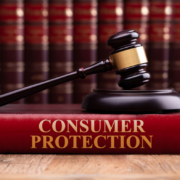For 125 years, America’s longest-standing consumer advocacy organization has made certain that the perspectives of consumers and workers play an important role in shaping government policies and business practices. The mission that began in 1899 continues today, but it involves taking on new and emerging challenges in a rapidly changing world.
A VIGILANT FOE AGAINST FRAUD
Fraudsters get more clever every day. They take advantage of emerging technologies. They master new ways to use social engineering to exploit their victims. There are entire camps in other countries populated by victims of illegal trafficking who are kept against their will and forced to engage in activities to defraud Americans.
For every step they take, however, the National Consumers League is there to combat their scams and protect vulnerable consumers.

In 2024, scammers posing as law enforcement pressured
consumers to convert money into gold bars and hand
them over for ‘safe keeping’
NCL’s fight against fraud has three components. The first component is consumer education, utilizing interviews with media outlets, podcasts, and the organization’s Fraud.org website, to help people become more aware of the multiple ways in which scammers operate.
The second component is the far-reaching network NCL has built with law enforcement and partners in consumer-focused agencies. In 1992, NCL launched the National Fraud Information Center, which is Fraud.org. This website welcomes 100,000 unique visitors a year and has collected thousands of consumer complaints that are shared with a network of more than 200 law enforcement partners. Through its consumer education efforts and direct counseling support, Fraud. org has helped millions of consumers protect themselves and their loved ones against treacherous scams.
The third component is policy advocacy, because it is impossible for all consumers to keep up with the plethora of fraudulent activities. NCL has cracked down on the financial system’s more insecure payment methods, making it more difficult for bad actors to take advantage of them. NCL is expanding these efforts to focus on fraud related to gift cards, peer-to-peer payment apps, and cryptocurrency exchanges, to shut off criminal enterprises.
NCL’s anti-fraud work is victim-focused. For too long, fraud victims have been stigmatized, with blame placed on them instead of the criminals. For decades, victims felt they were at fault for being scammed. NCL has made it a priority to change the way the media and policymakers speak about fraud, making it clear that this is a crime and that we should not blame the victims who need to be supported.

NCL has been a powerful voice for airline passengers and safety
ADVOCATING FOR ACCESSIBLE, AFFORDABLE HEALTHCARE
Healthcare in the United States is incredibly complex with many moving parts. For NCL, it boils down to a simple and essential principle —every person should have access to affordable, high-quality care.
Today, consumers and patients can face a bewildering array of barriers standing between them and the care they need. NCL has been their ally, testifying frequently against unreasonable policies like care-delaying prior authorization, step therapy practices that force patients to fail with insurer-preferred treatments before they can get what they need, and the measures taken by pharmacy benefit managers, or PBMs, to steer patients to higher-priced, profit-generating medications. NCL has been a strong advocate for a well-functioning healthcare marketplace, one that offers consumers genuine choice and the information essential to make educated decisions to protect and strengthen their health.
This emphasis on access includes a strong focus on reproductive health and opposing the multiple efforts in Washington, DC and state capitals to block women from utilizing critically-important services. Today, NCL is adhering as strongly as ever to a philosophy integral to its founding, that women must be free to make their own choices.
During the COVID pandemic, NCL prioritized another aspect of its healthcare advocacy efforts, combating misinformation and building confidence in public health efforts. Today, public health is under relentless attack with the public being bombarded with false claims about vaccines and services vital to protecting population health and well-being. During the pandemic, NCL played an important role in getting vaccine misinformation removed from public platforms and continues this work today, partnering with multiple organizations in the Coalition for Trust in Health and Science.
NCL will continue to champion healthcare policies that fall in the intersection of innovation, affordability, accessibility, and equity. This work manifests in multiple ways, from focusing on access to affordable biosimilar medications to educating consumers on how artificial intelligence can be utilized to strengthen health care efficacy.
To proactively help patients protect their own health, NCL’s Script Your Future initiative will continue to elevate public awareness about the importance of medication adherence.

World Day Against Child Labor on Capitol Hill, 2017 (L to R) Reid Maki,
Director of Child Labor Advocacy and Coordinator of the Child Labor
Coalition, Melyssa Sperber, Humanity United, Nobel Peace Prize Laureate
Kailash Satyarthi, Anjali Kochar, Kailash Satyarthi Children’s Foundation of
America, Jo Becker, Human Rights Watch
PROTECTING CHILDREN
Consider these recent scenarios: a child suffering chemical burns from working with caustic chemicals in an agricultural processing plant; another experiencing severe injuries from getting his arm caught in a conveyor belt; children falling asleep in school after having worked an overnight shift.
Fighting exploitative and dangerous child labor has been critical to the National Consumer League’s history and is integral to its current and future mission. Along the way, the League has won major victories in the early part of the 20th century through passage of the Fair Labor Standards Act, and its protections against child labor.
An important part of this work is raising public awareness. Most people believe that child labor is a problem of society’s early industrial age when, in fact, 160 million children globally are engaged in labor inappropriate for their young ages and, while there was 20 years of progress in which those numbers were going down, they have recently been creeping back up. That makes NCL’s work so very important.
This work has been both offensive and defensive—fighting to close loopholes in the law that allows employers to have children as young as 12 work long hours in back- breaking and sometimes hazardous jobs while, at the same time, fighting efforts in Congress and the states that would further loosen these laws and enable enterprises facing labor shortages to further exploit minors.
There have been important victories – for example, achieving a ban on kids applying hazardous pesticides, and preventing proposed regulations that would allow children to operate difficult patient lifts in nursing homes without supervision – but the work continues, beginning with raising public visibility.
NCL is the driving force in making the public more aware of the pervasiveness of child labor, working closely with journalists who are producing exposés on the issue and shining a spotlight on farms and processing plants that are exposing children to hazardous labor resulting in serious, life-threatening injuries. In 2023, NCL interviewed with over 120 media outlets, elevating the visibility that helps drive public policy.
And that public policy is percolating. NCL is working closely with members of Congress to raise the currently-too-low fines imposed on employers that violate child labor laws and is forming partnerships in multiple states to fight ongoing efforts by trade associations to weaken the existing laws and regulations protecting children.
Building potent partnerships is at the core of NCL’s work. The organization created the Child Labor Coalition, bringing together nearly 40 major organizations and is currently managing the Campaign to End U.S. Child Labor, engaging on initiatives such as banning child labor in domestic tobacco production.
EMPOWERING TODAY’S AND TOMORROW’S CONSUMERS
Letting kids be kids and not fodder for a global economy in search of working bodies will continue to be at the core of NCL’s mission. These are challenging times for consumers. In recent years, changing regulations and the growth of corporate oligopolies have made households feel like the deck is stacked against them. NCL is an ally to consumers nationwide, making sure they are protected against unfair and predatory practices and working to improve their lives while, at the same time, preparing future generations of consumers to be better empowered to protect themselves.
NCL has exerted its influence with a broad array of industries, such as the airline industry where NCL has fought for the establishment of stronger protections for airline passengers, getting family seating fees outlawed, rules to keep vouchers from expiring, and enabling those experiencing canceled and delayed flights to receive swifter refunds.
For fifteen years, NCL has taken on the fight for a fairer live event industry, fighting back against monopolistic ticketing giants and unscrupulous ticket resellers. Thanks to NCL’s advocacy, “ticket bots” were outlawed by Congress. And we are now on the cusp of making fans’ biggest gripe—out-of-control add-on ticket fees—a thing of the past.
From advocating for the use of technology to make automobiles safer to pressing for regulations to ensure the safety of CBD products, NCL will continue to insist that corporations and government make the consumer interest a priority.
NCL’s focus is not only on protecting consumers today, but in forging new generations of consumers well equipped to navigate an increasingly complex environment.
Now in its 30th year, the LifeSmarts program educates young people throughout the country and introduces them to the consumer movement. Structured as a fun competition to engage both students and teachers, LifeSmarts gives the next generation real- world knowledge on subjects including personal finance, consumer rights and responsibilities, environment, technology, and workplace health and safety, while also focusing on current issues like medication safety and reducing food waste.
LifeSmarts participants take what they learn and share it with peers, parents, and even grandparents. There are households across the country more financially secure today because of what students have taken away from the LifeSmarts program.
As a former winner from Frederick County, Maryland said, “I use LifeSmarts lessons every day, in every purchase I make from grocery shopping to car buying, when I compare terms on a credit card or find the best interest rates on loans. I learned how to spot email scams, fake websites, and probably a hundred other things I didn’t even realize I learned in LifeSmarts.”


























